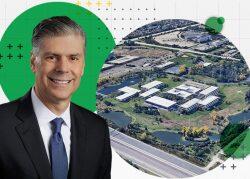A developer is withdrawing its plans to turn the Baxter International campus in Deerfield into an industrial park after the plan faced backlash from local residents.
On Wednesday Bridge Industrial informed Deerfield that it had pulled the proposal for the site, Crain’s reported. The company had asked the village to annex the campus, which it then planned to demolish and build a 1.1 million-square-foot logistics hub and a sports complex.
The plan did not have support from local leaders or neighbors, and residents adjacent to the property that live in nearby Riverwoods had fought the plan.
While Bridge could move forward with the project without the annexation into Deerfield — the property is currently in unincorporated Lake County — it appears unlikely.
Rather, without support from public officials, Bridge plans to abandon the project, which would also terminate the agreement the company had to purchase the property from Baxter for between $90 million and $100 million.
It’s unclear whether Baxter will put the property up for sale again. In 2022, the medical products giant Baxter hired JLL to market its 101-acre, 10-building campus at 1 Baxter Way in Deerfield while the company searched for new office space in the Chicago area. No asking price is listed for the property, which totals 646,000 square feet of buildings developed in the 1970s.
In January, Bridge Industrial had an agreement to buy the 101-acre property in the northern Chicago suburb.
The deal follows the recent trend of office properties being redeveloped for different uses in response to many companies downsizing commercial real estate footprints and the surge in demand for logistics properties.
The adaptive reuse of such properties helps make up for lost revenue from vacant offices and mega-campuses as remote work has increased post pandemic. Redeveloping the properties into logistics and warehouses allows for an increase in needed warehouse space as the demands two-day shipping increase.
Warehouses and logistics can lead to challenges for communities, where opponents say heavy trucks cause more wear and tear on roads, as well as an increase in pollution and traffic.
— Miranda Davis
Read more


